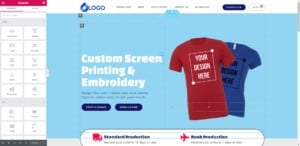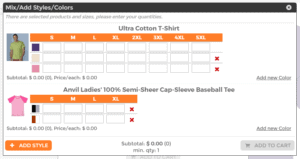
Articles
Finding a Niche Market For Your Print Shop.
Whether you’ve been in the print industry for a while or have only recently entered into the business via web to print storefronts, it’s worth reviewing your marketing choices on a regular basis. Is your current strategy working or is it time to try something new? If your marketing strategy feels unwieldy or it just doesn’t seem to be generating the leads you were hoping for then, obviously, there may be a number of reasons for this. One common mistake that many businesses, not just web to print stores, can find themselves making is trying to attract a market that’s too general. It’s understandable – you want to sell to everyone and anyone you can. The problem with that, unfortunately, is that you’ll struggle to find the right way to communicate with too diverse a group of potential customers. Once you’re well established and successful, then certainly, you can diversify and use targeted marketing campaigns to try to sell different goods to different audiences. For a start up, however, or even an older business that’s losing ground in a competitive environment, the best strategy might be to pick a niche market that you can focus all your promotional energies on. You might be reluctant to try this, thinking that it’s more likely to set limits on your potential sales, rather than improve them and certainly, if you pick a niche that’s just too, well, niche, then that might be the case. If there really are no other print shops that specialize in supplying t-shirts for fans of some obscure ancient folk music tradition, then that might be because there aren’t any customers in this particular niche. The trick is to find a market that’s significant in size and likely to have a healthy appetite for products such as your own but is not already over-supplied.
If that sounds like a tall order, then you could start looking close to home for your niche market. If you, or your family, friends or staff, already have an interest that could be served by your print business, then you can start by considering that. Is this interest something that is shared by significant numbers of other people and do that have a need for your products? If they’re already ordering from you, as a result of your existing connections, then this is a good indication that the market is there and worth targeting. If you’re lucky enough to already have a ready-made niche market in this way, then you should seriously consider exploiting it. You need to be objective, of course – don’t get too attached to the idea if it really isn’t going to generate enough business for you but, if it looks promising, then you already have many advantages over your competitors to help you market to this niche.
For a start you, or members of your immediate circle, are already a part of this group. You already understand what it’s all about, what causes people to be drawn to this particular topic, what will be attractive to other people who share this interest and how best to communicate with them – all things that you would have to find out from scratch, if you were trying to exploit a gap in the market that you have no prior connection with. Not only that but you already have the contacts that you need to get started on your marketing campaign. You might want to offer some form of reward, such as a discount or free t-shirt to any local connections who will help you spread the word about your business. You’ll need a social media presence, of course and there’s a good chance that your niche market will have social media pages that you and your connections may already follow. Reward your existing contacts for posting about your business on community websites, forums and social media pages – it’s much better if these posts are seen to come from someone not directly connected with the business, as that way the information looks like a useful tip, rather than an obvious promotion.

Having said that, if you’re already a known person in the community’s social media scene, then you can certainly make a personal announcement, when you get started with your new niche, to tell people that you will have a new product line available that will be of interest to them. After that, though, don’t overplay whatever popularity you have, in case it wears thin. Of course, at this stage, you need to do everything that you can to generate referrals within your niche, both locally and in the wider online community. It should be stressed, though, that ‘doing everything you can’ also includes knowing when to back off. If you get a reputation amongst the other members of the niche for always trying to make a buck out of every situation, then you’ll lose goodwill and potentially lose business…not to mention spoiling the enjoyment that you or someone close to you used to take from this group in the first place! Indeed, there are always potential dangers when you mix business with pleasure so, as well as all the commercial considerations that you need to explore when deciding whether to exploit your own hobby or other interest as a niche market, you do need to take a step back and ask yourself how important it is to you on a personal level. If it’s the only outlet that you have for relaxation and putting the worries of the working day behind you, then trying to turn it into a business opportunity at the same time might be too much of a risk to your own well-being.
So, if you decide that you’re not going to use a personal interest as a niche market opportunity, where else can you look? Well, you may still not have to look too far. Perhaps you already have some regular customers with a wider appeal, who you could focus on. If you’ve noticed, for example, that there are a lot of active churches in your area, who place regular orders, then this is certainly a market that would be worth exploring. Establishing your business firmly within this sort of niche market can bring all sorts of additional benefits. It’s certainly the case that if you gain a reputation for being the printer that the churches can rely on, then you will build up a lot of goodwill amongst, not only their congregations but also the wider public, who will still tend to regard an endorsement from such a source as a sign of integrity and dependability. You might want to consider reducing your costs for certain jobs, such as materials needed for fundraising campaigns and other worthwhile causes. Offering a discount in support of good causes might well be something that you want to do anyway, in the course of your business dealings but the fact remains that getting a reputation for ethical and socially responsible practices will probably bring in extra business and generally improve your customer relations, as well as bringing you an added layer of job satisfaction.
However you decide on your niche, you’ll need to make sure that you understand the market and are offering goods that will attract members of the group that you’re targeting. If you’re not already familiar with it, then you’ll need to put some effort into researching what makes this niche unique. Hopefully, even if you’ve not come across this particular niche before, it is something that you can understand the appeal of. If you really can’t understand why anyone would like this style, or music, or art form, or whatever the niche is, then you should think very hard before deciding that this is the niche market for you. It just isn’t a good idea to try to get into a market that you know that you can never relate to – not only will you be setting yourself up for a pretty tedious working life, creating products that you actually don’t like, you also don’t stand much chance of being able to market effectively to the people who genuinely are into the scene.

When you do send out marketing communications, you will need to be certain that you’re using the kind of words and phrases that your potential customers can relate to. Make personal contact with people who are already in your target market and offer them special deals in return for their help. Use social media to reach out to other members of the group and find out about their likes and dislikes. If you’re selling custom printed t-shirts online, then you could run a special design competition, asking followers of your niche’s social media pages to use your online design software to create the perfect design to represent the spirit of…whatever their interest is. For a relatively small outlay, you could gain valuable insights into what will really appeal to the taste of members of your target market. As always, ask for referrals and offer something of value to members of the group who share your posts and links.
When you develop new designs for the niche, don’t be afraid to showcase them on social media. Ask the community for feedback and try to respond with good humour, regardless of what the reactions are. If you get negative comments about your styles, then send a friendly reply, including a link to your design software page and an invitation to the writer to show you how it’s done – if they really can do better then you might still get some business if they are happy to resell their design! Also, don’t limit yourself, when it comes to social media. Facebook and Twitter might be the giants of the scene but take advantage of as many other platforms as you can. Instagram is a great place to show off your best designs, as it’s image based, so you can upload whole galleries of your work.
Another important thing to remember about niche marketing is that you don’t have to reinvent the wheel. Assuming that you haven’t, genuinely, found a market that absolutely nobody else in the world has thought of selling to (and, if you have, just, ‘Wow’!) there will be other people already doing what you’re trying to do. Don’t resort to plagiarism but do check out what they are doing. Are they successful? If they seem to have this market figured out, then you can use their designs and marketing techniques as a starting point to devise your own campaign. Read their social media posts. Have they found a style that resonates with this particular audience? What sort of responses do their posts get? Is there anything that they could improve upon? This last question is key. The challenge you need to set yourself is not ‘How can I do the same thing these guys are doing?’ but ‘How can I do better?’.
As you start to establish your brand as a permanent (and hopefully well-liked) feature of the group’s scene, you’ll need to maintain and probably increase communication with its members. You’ll need to seem enthusiastic about the niche’s interests, even if you don’t, initially, feel that way. With a bit of luck, over time, you’ll start to understand what it is that draws people to this niche – your enthusiasm is more likely to grow if it provides you with a successful business, of course but, who knows, once you’ve learned all you can about what makes other people so keen on this niche, you may even become a genuine devotee! Check out this article on Entrepreneur for more ideas on finding your niche.
Share this post


Websites For Sign Shops and Large Format Printers

What is CRM Software

Announcing DIY Plans

Feature Spotlight- Mix Styles and Colors
Newsletter
Related Posts


Websites For Sign Shops and Large Format Printers


